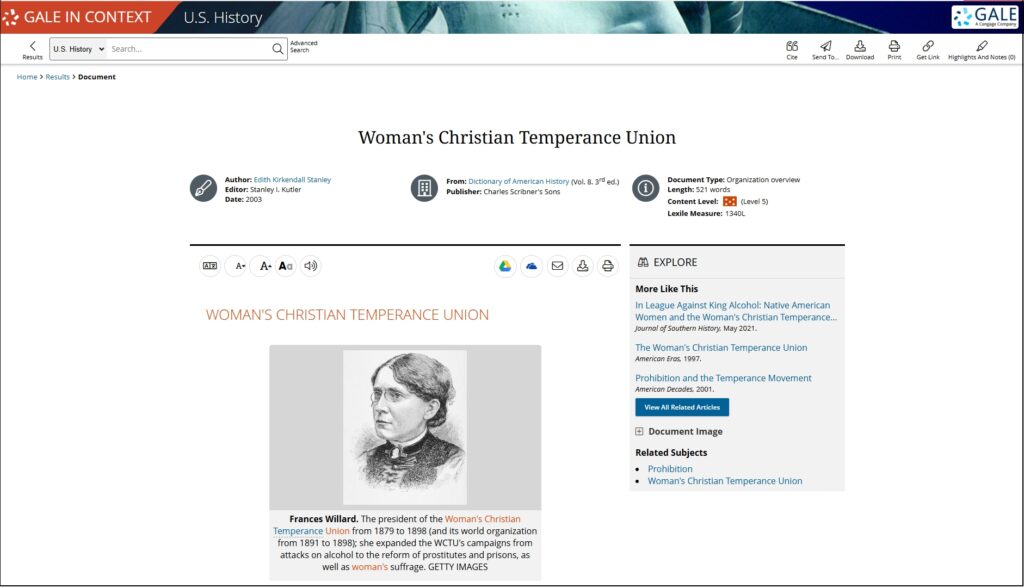| J. Robert Parks |
Throughout its history, the United States has had advocates and adversaries for different causes, including the distribution and consumption of alcohol. One of the earliest groups that brought attention to the effects of alcohol abuse was the Woman’s Christian Temperance Union (WCTU), which was formed 150 years ago this week, on November 18, 1874. Teachers and librarians wanting to educate students about alcohol awareness, women leaders, or America’s history of reform movements will find plenty of material in Gale In Context: U.S. History.
The WCTU was an outgrowth of the Woman’s Temperance Crusade, which had taken place the year before, in 1873. Women were frustrated by the impact that alcohol consumption was having on their families. They started gathering spontaneously, marching to saloons to protest and sing and pray and sometimes to empty liquor barrels and destroy the drinking establishments. A year later, they held a national convention in Cleveland, Ohio, and there the WCTU was founded.
Temperance organizations were just one of the reform movements that gained steam in the second half of the nineteenth century. The industrial revolution, an influx of immigrants, and the growth of cities all contributed to significant societal change as well as the belief that widespread societal reforms were needed. The response was known as progressivism, and it included everything from civil rights to women’s suffrage, labor unions to urban reform. Women were often at the forefront of those movements despite the widespread sexism they faced.
One of the most famous reformers of the time was Susan B. Anthony. She is best known for her leadership in the women’s suffrage movement, but she was also involved in the temperance movement. She became president of the local Daughters of Temperance in 1851 and attended a meeting of the Sons of Temperance in 1852. She was told, however, that women were “not invited there to speak but to listen and learn.” That galvanized Anthony to focus on fighting for the rights of women.
One of the WCTU’s most important leaders was Frances Willard, who led the organization from 1879 to 1898. She helped expand the WCTU’s mission, embracing what was called a “do everything” philosophy. This included adding prison reform, the moral reform of prostitutes, and women’s suffrage to the WCTU’s goals. Willard argued, in particular, that women obtaining the vote would make it much more likely that prohibition legislation could be enacted.
As it happened, the Eighteenth Amendment, which established Prohibition, was ratified in January 1919, roughly eighteen months before the Nineteenth Amendment, which gave women the right to vote. Well before that, however, the temperance movement had shifted. The WCTU struggled financially in the wake of the economic crisis of 1893. The organization also lost ground to the General Federation of Women’s Clubs, which was made up of white middle-class women, unlike the racially mixed WCTU. The WCTU was even affected by the rise of Jim Crow.
Although the temperance movement won the battle for Prohibition, it may have lost the war against alcohol consumption. Prohibition closed down public bars and saloons, but it hardly stopped people from drinking altogether. It also led to an escalation of organized crime, exemplified in the person of Al Capone. Prohibition was finally repealed in 1933, and its reputation as a failure has hindered anti-alcohol reform movements ever since.
Nonetheless, the WCTU was significant as a female-led organization that empowered women to change the world around them. It provided opportunities for women to step into leadership in their cities and towns, and it paved the way for other women’s organizations and eventually the Nineteenth Amendment. The WCTU continues to exist today and has expanded to more than thirty countries around the world, with a focus not just on alcohol but on drug abuse as well, including the opioid crisis. The organization celebrated its 150th anniversary earlier this year in the state where it was founded.
About the Author
J. Robert Parks is a former professor and frequent contributor to Gale In Context: U.S. History and Gale In Context: World History who enjoys thinking about how our understanding of history affects and reflects contemporary culture.




